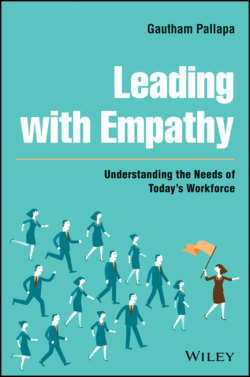Читать книгу Leading with Empathy - Gautham Pallapa - Страница 25
Finding the Silver Lining in These Dark Clouds
ОглавлениеIt is difficult to see the silver lining from this devastating pandemic, in addition to all the adverse events since early 2020. However, being a naive optimist, I firmly believe that there are some positives to all our suffering:
There is a vaccine (in fact, there are several!). Scientists across the world rallied together with a singular purpose of finding a vaccine for COVID-19. Humanity could not afford the long cycles of rigorous testing, but at the same time, they needed a level of confidence that the vaccine would work en masse. People worked around the clock, put themselves at risk, and pushed the boundaries of medicine, technology, human endeavor, and grit.
Stronger relationships. The pandemic has given people a chance to spend more time with their families and build genuine relationships. Parents are becoming more involved with their children. Family bonding has strengthened, and children are communicating better with their parents. People have found more ways to reconnect with their loved ones as sources of mutual support, advice, and care. On a personal note, I spent over 900 extra hours with my family and am grateful for the social distancing protocols to have given me a chance to create some beautiful memories with my wife and son. I could not have done this if we were not on a lockdown.
Better hygiene. We finally learned how to wash our hands properly in 2020! Our smartwatches now have apps that train us to wash our hands appropriately and for the right amount of time. People are now more aware of how important it is to practice hygiene, and it's no longer just a good habit but a skill you need to survive. The pandemic made us cognizant of maintaining our hygiene by sanitizing our hands after touching anything, covering our mouth while coughing or sneezing, and washing hands regularly. We also learned to gauge how much six feet distance is and respect people's personal space.
Reduced air pollution. With the shutdown of economic and commercial activities, people were confined in their homes. Traffic volume rapidly plummeted by over 80 percent, making a significant drop in the air pollution rate.50 NASA satellites have documented a substantial reduction of 20 to 30 percent in air pollution.51 As all the social, industrial, and urbanization activities stopped, nature bounced back and improved various environmental parameters, including air quality, noise pollution, and cleaner rivers.
Increased kindness. Social distancing has affected people's relationships and their compassion toward others. As life slowed down and with nowhere really to go, people started acknowledging, conversing, and even, in some cases, caring for their neighbors and the community's health and well-being. People are cooking meals for the needy, offering emotional and even financial support to those in need, and performing supermarket runs for those unable to leave their homes.
Prioritizing life over work. Many people have started to slow down and enjoy the time with their loved ones and friends. They have created new memories and experiences within the confines of their homes, in many cases strengthening their relationships. Work-life balance has become a more important aspect of many people's lives. Even though many people were sequestered in their homes for long periods, they created innovative ways to enjoy themselves.
As an optimist, I see these signs and feel hope that things will work out eventually. However, as a pragmatist, I know that we cannot rest on these meager triumphs alone. We must endeavor to bring more hope, cheer, and positivity into the world. But how do we heal a world that has endured an exponential amount of pain and suffering in such a short time?
